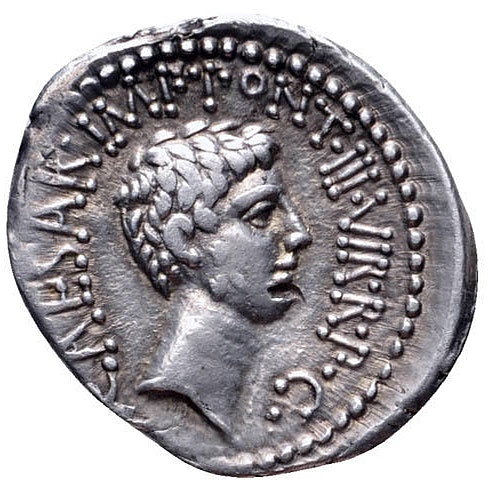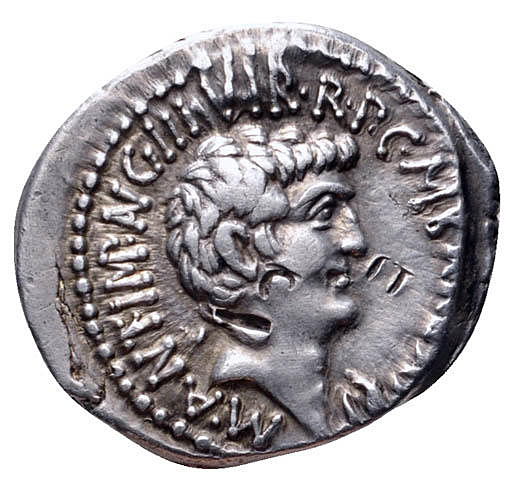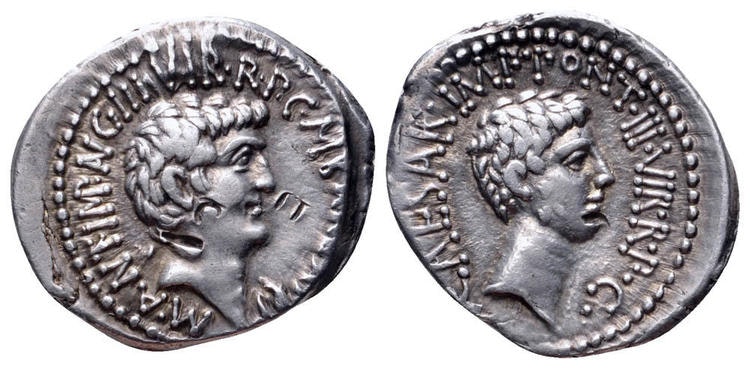Romerska riket, Markus Antonius & Oktavianus, Silverdenar ca 41 f.Kr. - LÄCKERT EXEMPLAR
Produkten är tyvärr slut i lager. :(
Romerska riket, Markus Antonius & Oktavianus, Silverdenar ca 41 f.Kr. - LÄCKERT EXEMPLAR
Ett klassisk MYNTTYP - Myntet präglat i propagandistiskt syfte för att påvisa "enigheten" mellan de två rivaliserande krigsherrarna Oktavianus (sedermera Kejsare Augustus) och Markus Antonius. Väl centrerad och fullt utpräglad med nästan full stämpleglans i fälten. Myntet har som sedvanligt sk "bankers marks" eller probermärken. Mynten under den här perioden var notoriskt underhaltiga och allmänheten testade regelmässigt "lödigheten" i silvermynten. Kvalitet ca 1+/01
ROMAN REPUBLIC
Marc Antony and Octavian AR Denarius. M. Barbatius Pollio, quaestor pro praetore. Military mint moving with Antony (Ephesus?), 41 BC. Bare head of Antony right; M•ANT•IMP•AVG•III•VIR•R•P•C•M•B[ARBAT•Q•P] around / Bare head of Octavian right, with slight beard; CAESAR•IMP•PONT•III•VIR•R•P•C• around. Crawford 517/2; RSC 8a. 3.80g, 21mm, 10h.
The issue with Marc Antony and Octavian is a type coin of great historical significance showing the "unity" between the two major ruling warlords of the Roman Republic. Its a typical display of Roman propaganda on coins!
Historical background
Following the murder of Julius Caesar, power fell into the hands of Marc Antony, Caesar's loyal lieutenant and commander of cavalry. Antony's position was soon challenged from Caesar's 18-year-old grand-nephew, Gaius Octavius, popularly known as Octavian, when he arrived in Rome to claim his legacy as Caesar's heir. Octavian, as sole heir to Julius Caesar, soon secured the loyalty of Caesar's followers and undermining Antony's authority. By 43 BC, Octavian had actually managed, by the Senate, to declare Antony a public enemy, but he soon changed his mind. For strategical reasons, Octavian, Marc Antony together with Lepidus joined forces and shared supreme power, with the ultimate aim of hunting down Caesar's assassins (Marcus Junius Brutus and Gaius Cassius Longinus). This task accomplished (Battle of Philippi 42 BC) , Lepidus soon faded into the background, leaving Octavian and Antony to rule the Roman world jointly for the better part of a decade until their inevitable showdown at Actium BC 31.
.
This denarius, struck in mid-41 BC in the eastern half of the Empire ruled by Antony, puts the political situation in stark terms, with Antony and Ocavian, still sporting youthful long sideburns, on opposite sides. While Antony occupies the dominant obverse, Octavian calls himself by the magical name Caesar, which would soon become a title for all Roman emperors.


